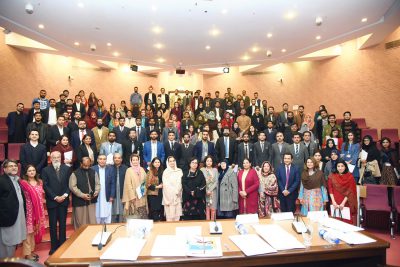
On Dec 12, 2019, Pakistan Institute for Parliamentary Services in collaboration with Women Parliamentary Caucus and CDIP-Tabeer organized a Seminar on National Voters’ Day at PIPS auditorium, Islamabad. The theme of this years’ seminar was closing the gender gap in electoral rolls highlighting the challenges, gaps and way forward for ensuring gender inclusivity. The seminar was attended by over 110 honorable parliamentarians of National Assembly and Senate, Legislative Assembly of Gilgit Baltistan, members of civil society, representatives from ECP, students and faculties of six universities including Quaid-e-Azam University, NUST, Air University, Hamdard, RIPAH and CUST, Islamabad. Honorable Member National Assembly and Secretary WPC Ms. Munazza Hassan was the chief guest of the occasion.
The seminar inaugurated with national anthem and recitation of few verses from holy Quran. Executive Director PIPS Mr. Muhammad Rashid Mafzool Zaka welcomed the participants and shed light on the history of Parliament of Pakistan and role of women leaders as building blocks of it. He further lamented on role youth needs to play in closing the gender gap and make Pakistan prosperous with enhanced gender inclusiveness. The first session of seminar was addressed by representative of DAI-Tabeer, Mr. Mukhtar Ahmad Ali who shared in-depth analysis of prevailing situation of gender gap in electoral rolls and recommendations for reforms. While sharing the statistics, he said that there exists a gender gap of 12.5m in electoral rolls and a significant percentage of citizens of 18 years or older are not on the rolls. He further elaborated the role and responsibility of NADRA and ECP in reducing the gender gap and social, legal and institutional constraints in achieving the desired objectives. Suggesting the way forward, he said that NADRA ordinance needs to be reviewed and amended. Following his presentation, representative from Election Commission of Pakistan Ms. Nighat Siddique, Additional Director General (Gender Affairs) presented the steps taken by ECP to close the gender gap in electoral rolls and steps needed to improve the prevailing situation for the next general elections – ensuring gender inclusivity and reducing the gender gap. She shared the statistics of registered voters (male and female) and said that as of April 2019, the number of registered male voters is 60,028,514 and that of female is 47,486,143. Furthermore, Ms. Nighat underscored the initiatives of ECP such as establishment of the Gender Affairs Wing in the ECP Secretariat to maximize women participation in the democratic process and establishment of the Gender and Disability Electoral Working Group (GDEWG) to mainstream women and other marginalized groups into the electoral process.
Following the presentations, honorable parliamentarians engaged in a candid and insightful discussion sharing their recommendations for ensuring inclusivity and underscoring challenges which prevail and needs immediate attention. Hon’ble Member Legislative Assembly of GBLA, Ms. Shireen Akhtar presented the case of Gilgit Baltistan and impediments to gender inclusiveness in area. She stressed upon the need to enhance gender sensitivity at domestic levels for broader national goals of gender inclusiveness. Hon’ble Senator Ms. Seemi Ezdi highlighted the need to create awareness before elections and assured complete support to ECP needed from the parliamentarians in this regard. Hon’ble Member National Assembly Ms. Farrukh Khan and Uzma Riaz recommended mobilization of women for effective outreach campaign in registering women voters through door-to-door campaigns. Hon’ble Member National Assembly Nosheen Hamid while sharing her input said that female parliamentarians are very effective legislators and it is the women who lobby and make efforts for women specific legislations. Hon’ble Member National Assembly Ms. Nafeesa Inayatullah Khattak also shared her remarks with the participants and highlighted the steps taken by parliamentarians in ensuring gender inclusivity in electoral roles. Chief Guest of the occasion Hon’ble Member National Assembly and Secretary WPC Ms. Munazza Hassan stressed upon the need to engage women in electoral process and underscored the steps taken by Women Parliamentary Caucus in achieving the vision of gender inclusive Parliament and Pakistan. She thanked Pakistan Institute for Parliamentary Services and CDIP-Tabeer for organizing the informative and awareness raising seminar on one of the most pressing issues faced by the country. The interactive discussion was followed by a through Question and Answer session between participants and panelists of the seminar.
In concluding session, Team Leader CDIP-Tabeer Mr. Quraysh Khan extended vote of thanks to the participants of the seminar and emphasized on the need to organize such seminars for the youth as they are the future of country. Director Research PIPS, Ms. Tehseen Khalid moderated the Seminar and also extended her vote of thanks for the participants. Mr. Areeb Sherazi, Ms. Laraib Kiani, Mr. Asim Khan and Ms. Adeela Shahzadi, Young Parliamentary officers at PIPS worked tirelessly to make this event successful. The seminar officially concluded with a group photo and presentation of souvenirs to panelists and faculties of participating universities.
Key recommendations from panelists